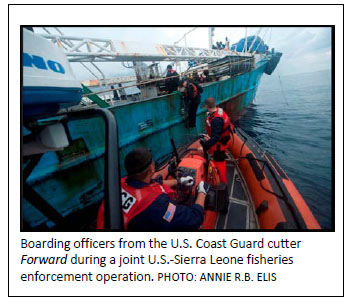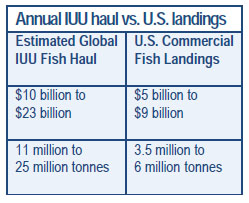Keep Illegal Fish Off America's Dinner Plates
Support the International Fisheries Stewardship and Enforcement Act
 The International Fisheries Stewardship and Enforcement Act (IFSEA) (S. 269) was introduced Feb. 11 by Sens. Jay Rockefeller (D-W.Va.), Lisa Murkowski (R-Alaska) and eight co-sponsors to strengthen critical enforcement tools and eliminate illegal, unreported, and unregulated fishing.
The International Fisheries Stewardship and Enforcement Act (IFSEA) (S. 269) was introduced Feb. 11 by Sens. Jay Rockefeller (D-W.Va.), Lisa Murkowski (R-Alaska) and eight co-sponsors to strengthen critical enforcement tools and eliminate illegal, unreported, and unregulated fishing.
IFSEA compliments other legislation that also addresses IUU fishing, particularly S. 267, the Pirate Fishing Elimination Act..
What is IUU fishing?
- Illegal, unreported and unregulated (IUU) fishing, or pirate fishing, is a global problem that poses a serious threat to the commercial viability and environmental sustainability of fish stocks.
- Global economic losses from IUU fishing are estimated at up to US$23 billion annually;
- IUU fishers steal an estimated 11 million to 26 million tonnes of fish from the ocean each year—roughly three to six times more fish than the U.S. commercial fishing fleet catches annually.
- The U.S. fishing industry supports nearly 1 million American jobs. IUU fishing undermines hardworking U.S. fishermen and the U.S. fishing industry, which has few compliance issues compared to most foreign fleets. Foreign illegal operators undercut the U.S. market with cheaper, illegally-caught imports.
- Unfortunately, the penalties imposed on illegal fishers are often so low that the operators consider the fines a cost of doing business. One study found that penalties would have to increase 24 times (on average) above current levels to act as a sufficient deterrent to illegal operators.
How would IFSEA help eliminate foreign IUU fishing?
 IFSEA would streamline, strengthen and better coordinate the enforcement capabilities of the United States to identify, apprehend, and prosecute foreign illegal fishing operators, and help Regional Fisheries Management Organizations (RFMOs) achieve sustainable catch quotas.
IFSEA would streamline, strengthen and better coordinate the enforcement capabilities of the United States to identify, apprehend, and prosecute foreign illegal fishing operators, and help Regional Fisheries Management Organizations (RFMOs) achieve sustainable catch quotas.
Passage of IFSEA would send a message that the United States will not tolerate crime on the high seas and that it is committed to protecting U.S. fishermen, our coastal economies and the sustainability of fish species. Specifically, IFSEA would:
IFSEA would:
- Target foreign illegal fishing vessels that violate high-seas fisheries agreements;
- Establish consistent and streamlined enforcement protocols in U.S. laws governing international fisheries, thus improving the ability of U.S. authorities to detect, track and prosecute foreign illegal fishing activity;
- Promote inter-agency collaboration to increase the overall efficiency, effectiveness and coordination of illegal fisheries enforcement;
- Establish a list of vessels engaged in illegal fishing and authorize enforcement action against those vessels, such as restricting access to U.S. ports; and
- Improve the sustainability of global fish stocks through compliance with RFMO agreements.
How will passing IFSEA help the U.S.?
Foreign illegal fishing threatens the U.S. industry, undercuts the market with cheaper imports and undermines efforts to sustainably harvest fish in international waters. IFSEA will reduce illegal fishing – a win-win-win for the U.S. economy, consumers and the sustainability of our oceans. Time is running out. Please support immediate passage of IFSEA.
Contact Gerry Leape (202.887.1346) for more information.
References:
1 Agnew DJ, Pearce J, Pramod G, Peatman T, Watson R, et al. (2009) Estimating the Worldwide Extent of Illegal Fishing. U
2 Ibid.
3 U.S. Department of Commerce, National Atmospheric and Oceanographic Administration. (2011). Fisheries 4 Economics of the U.S. 2009: Economics and Sociocultural Status and Trends Series. www.st.nmfs.noaa.gov/st5/publication/index.html.
5 Sumaila UR, Alder J, Keith H (2005) Global Scope and Economics of Illegal Fishing.











